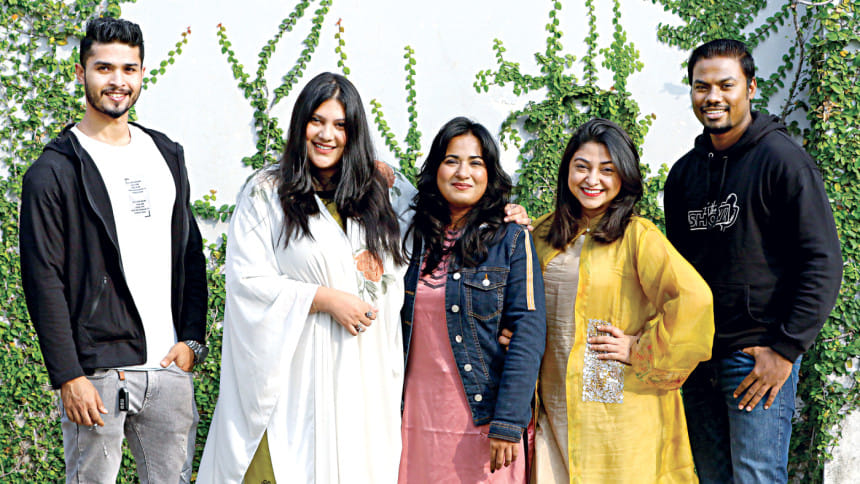Influencing as a career

Chances are, even if you don't "follow" a social media influencer or even totally understand what they do, you are familiar with the concept of what they do. Influencers are those individuals who have essentially established credibility in a specific area or industry. To be successful, they need to have access to an audience, preferably a large audience – hence, their "influence."
Today, not only do people appreciate what an influencer does, but a majority of social media consumers actually want to become influencers. We have award shows, and reputed brands investing in influencers, instead of opting for endorsements with more established celebrities. That being said, there is a social stigma attached to influencing as a career.
To explore what goes into earning livelihoods as influencers, The Daily Star invited five promising content creators — Rafsan Sabab, Shams Afroz Chowdhury, Kaarina Kaisar, Pari Rukh Al Matin, and Naseef Rahman— to a roundtable discussion.
"Influencers come from different backgrounds. I belong to a middle- class family. I really do not think influencing has been accepted as a full-time career in Bangladesh yet," said popular anchor and influencer, Rafsan Sabab. "There might be a few who are earning quite well, but most influencers are unable to support their families solely with this profession."
Rafsan, besides being the ambassador for many projects and brands, also hosts "What A Show", which is a hit with the audience.
He hopes to become Bangladesh's top 'late night host' some day, in the veins of Jimmy Fallon and Seth Rogen.
Shams Afroz Chowdhury, known for her page, "Thoughts of Shams", has a more positive outlook. "It has been two years since I got into content creation. I feel that it is much easier than a desk job," she shared.
"I have complete control over the content, as I come up with my own ideas. If I am able to earn money by doing something that I love, there is nothing wrong in making it my profession. Financially, I have sponsorships from brands and if I do not get any, I monetise my content through Facebook and YouTube." Currently with 2.6 million followers on Facebook, Shams rose to fame seemingly out of nowhere, due to her 'relatable' content.
"Although Shams is doing well on her part, many might not be able to get results like her," counteracted Rafsan. "It might seem lucrative to go all out and become an 'influencer', but one has to remember that this is a very hit-or-miss profession."
Rafsan emphasised that if one aspires to become an influencer, it is advisable to 'test the waters' and try it for a few months.
The discussion eventually shifted to why influencing is not considered a socially acceptable career.
Pari Rukh Al Matin, known for her page, "Unofficial Common Sense By Pari", talked about the negative aspects of the influencer community.
"Many influencers, as they get popular, start becoming indifferent to what is right and what is wrong. They start out creating content for fun. As they get more and more famous, the quality of their content drops drastically. This is a pattern," she said, suggesting that this lack of perspective leads to many promising content creators to lose out on the market.
"Content creators cannot become famous in the blink of an eye. It is the audience who builds them up. There is a greater demand for authentic engagement. An influencer should not champion one thing, and then go on to endorse a product that sends out a contradictory message," she further explained.
The discussion also addressed mainstream media's interest in influencers.
Naseef Rahman, an influencer who found his niche in bodybuilding and fitness, has won medals in many national and international bodybuilding competitions.
"In mainstream media, I usually play 'the guy with the good physique'. In truth, there are only a handful of roles where bodybuilding is properly utilised," he said. "I could have pursued acting more effectively if more roles demanded that. I did a short acting course under Gazi Rakayet, and then went to Sweden in 2017. When I returned, the pandemic was at its peak, and my acting career took a step back."
Kaarina Kaiser, who rose to fame with Daekho, now runs her own production house, The House of Chaos. She shared her thoughts on why mainstream media is keen on hiring content creators.

"Clients, at times, want certain influencers to be cast for their brand promotions. In terms of tele-fiction, makers tend to hire influencers when they want to cash in on their brand value."
She asserted that many brands now look towards content creators instead of 'established' celebrities, due to their appeal on social media.
"Facebook is a better platform than YouTube, when it comes to earning through views. If your usual Facebook video is three minutes or longer, and if the audience watches it for more than a minute, you can easily make BDT 20,000 through each video," said Kaarina.
Renowned companies are now investing on influencers to promote their brands, instead of spending huge sums of money on television commercials.
"Television commercials have higher budgets than online video commercials. Advertisers understand profoundly that the audience spends more time on social media platforms, compared to watching TV," mentioned Pari.
In addition to that, audience engagement can be easily measured through social media platforms, compared to television. PR companies and brands can easily get hold of their brand equity reports, through which they measure the reach of their target audience.
"We earn an average of roughly BDT 30,000 to 50,000 through each promotional campaign or project," added Kaarina.
Although unconventional and certainly risky, influencing is an increasingly lucrative career path for the country's youth. These five individuals, trailblazers in their own right, have set the stage for years to come – what remains to be seen is what the later generations of self-employed content creators do with it.
The author is Reporter, Arts & Entertainment, The Daily Star.
Email: [email protected].

 For all latest news, follow The Daily Star's Google News channel.
For all latest news, follow The Daily Star's Google News channel. 



Comments